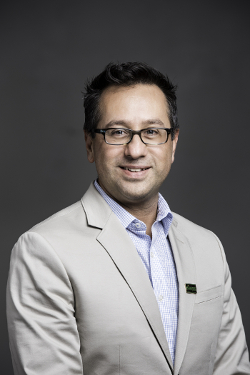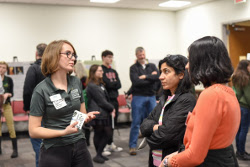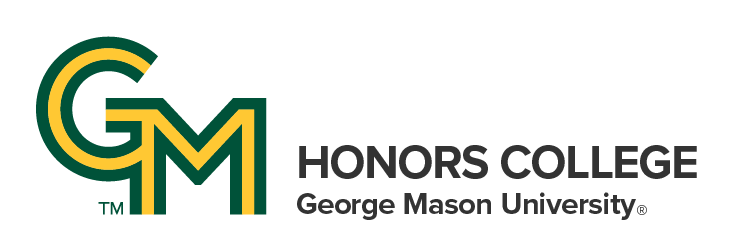Peer Research Mentors have played a central support role in Honors 110 Principles of Research and Inquiry courses for years. Effective Fall 2019, the Peer Research Mentor role will merge with other mentorship opportunities, forming a new "Peer Mentor" experience. Students who become Peer Mentors will guide Honors College first-year students through Honors 110, but also will play a more supportive role in the social life of the new students.

Dr. John Woolsey, who coordinates the Peer Mentorship in Honors experience
The "Peer Mentorship in Honors" experience offers “an opportunity for the people who are serving as Peer Mentors to really grow, and that’s why it was really important to rethink the curriculum from [their] angle,” said Honors College Research Curriculum Coordinator Dr. John Woolsey, who leads the group.
The next generation of Peer Mentors will enroll in a section of Honors 261: Community Connection Practicum, a new civic engagement course. Here, they will receive an academic training for fostering and facilitating community engagement in the Honors College.

Gemma Carretta, a long-time Peer Research Mentor, helping a prospective student family at a recent admissions event
Drawing on her experience as a Peer Research Mentor in past years, sophomore Gemma Carretta appreciates the emphasis on social connections that will be placed on Peer Mentors next year. The Global Affairs major values making connections with her students since it creates an atmosphere of trust for the student when reaching out to her for help.
Carretta and Julianna Nicolaus, a sophomore Bioengineering major, both were on the Curriculum Development Team the spring semester of their freshman years and wanted to continue their impactful leadership roles through mentorship. Dr. Woolsey noted how there is often overlap with the students who are a part of the team and Peer Mentors.
The Curriculum Development Team is comprised of a group of students who assess the lessons, workshops, and activities of Honors College courses and develop ways to improve existing methods or create new programs. This year, the group has also been tasked with defining what the new Peer Mentors and curriculum for its Honors 261 section will look like. Carretta and Nicolaus noted that one way the mentorship experience will improve is through a stronger dialogue between mentors and their leaders about what is and is not working for their classes.
Sara Huzar, a senior global affairs and history double major, has also served in both the Curriculum Development Team and mentorship roles, crediting Dr. Woolsey for how much freedom he gives these students in creating innovative ideas to better the courses. While having a variety of perspectives can be difficult to manage when making decisions, Huzar appreciated the diverse approaches present on the team.
“I think it was good to have all those different opinions because it made the agreement that [we] came to much more solid and rich,” said Huzar.
Being a part of the Curriculum Development Team or Peer Mentors also has its benefits for the students serving in those roles, like Nicolaus, who values the leadership skills she gained from being a mentor.
For Huzar, one of the greatest rewards of mentoring came when she saw students learn and grow through their own breakthroughs in research or understanding a complex concept.
After serving for a couple of year as a Peer Research Mentor and helping on the Curriculum Development Team, Huzar was among the first cohort of Lead Research Mentors in Fall 2018. In the future, Peer Mentors will have the opportunity to apply to join a special section of Honors 361 Multidisciplinary Practicum for Lead Mentors after they have completed Honors 261.
The current Lead Mentors are currently in the process of choosing the new group of mentors. They, along with Dr. Woolsey and other Honors College faculty, hosted and judged a collaborative challenge for the potential mentors where students worked in small groups to come up with an innovative idea to tackle an issue that Honors College freshmen face. Huzar developed the idea, hoping to create a scaled-down version of what the mentors can expect if they enter the role.
Dr. Woolsey has one main piece of advice for the new Peer Mentors: “Be present.” Similar to Nicolaus and Carretta, Dr. Woolsey believes it is important that mentors not have their discipline or own Honors 110 experience prevent them from connecting with students who may have other disciplinary interests or other Honors 110 experiences.
Every student is going to need something different from you. […] Every year is going to be different [...] Be adaptable. Be flexible. It’ll all work out.
Sara Huzar, Lead Mentor
Both Nicolaus and Carretta emphasized that effective mentors learn to help students feel authority over their own projects, starting from the beginning of the research experience. Nicolaus stated, “[The research project] needs to be an idea that [the students] have and that they're really passionate about and willing to pursue.” She went on to note that without this passion, students can have a hard time finding the determination to complete the research well.
Carretta also wants prospective Peer Mentors to know that “there’s not one perfect type" of student who can ben an effecitve mentor. All students have something valuable to contribute to the group and to their students. Carretta hopes that the new group will enter the role with a passion for mentorship.
Nicolaus encourages the new Peer Mentors to embrace the socially supportive side of their role. “Do whatever [you] can in the community even if it seems like a really small step,” said Nicolaus. “[That small step] can make a really big difference for somebody.”
Original reporting by Zaria Talley
